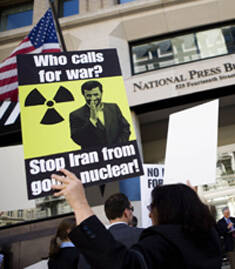The brinksmanship between the West and Iran over that country’s nuclear ambitions appeared to enter a new and dangerous phase earlier this month, when the Iranians did not accept the West’s latest offer to set aside further economic sanctions if the Iranians immediately stopped enriching uranium. Representatives of six Western nations had given Iran until Aug. 2 to reply to their offer. Iran allowed the deadline to pass, then responded 48 hours later with little that was new. In the interim it deployed a new long-range weapon it said was capable of striking U.S. ships in the Persian Gulf. In return, the United States and its allies have said that they will pursue additional economic sanctions. Meanwhile, Israel, which fears that a nuclear Iran would wipe Israel off the map, continues to prepare its Defense Forces for a strike against the Iranian nuclear facilities.
Such an attack would be a catastrophe. Among other things, it is impractical, as an attack would likely only delay the Iranians, not stop them. The principal elements of Iran’s nuclear program are spread out among numerous locations and population centers, decreasing the likelihood that an Israeli strike would eliminate the nuclear threat and increasing the likelihood of Iranian civilian casualties. Also, an Israeli attack would invigorate Iranian nationalism, silence the moderate voices in Iranian politics and rally support for the Tehran regime. Lastly, Iran would almost certainly retaliate by striking targets in Israel and U.S. forces in Iraq and Afghanistan and possibly by blockading the Strait of Hormuz, choking off the world’s oil supply. The Bush administration should make it clear to Israel that a military strike would be a perilous and unacceptable escalation.
Vigorous and inventive diplomacy is the best means of escape from the impasse. Additional economic sanctions may be effective, but only as part of a comprehensive diplomatic strategy. The good news is that the Bush administration, its foreign policy long held hostage by ideology, has at last adopted a more realistic approach. It wisely chose in July to send the State Department’s third-highest ranking official to Geneva for the first official face-to-face talks between the United States and Iran since the Carter administration. There are also reports that the State Department may open an interest section in Tehran, a first step on the long road to full diplomatic relations.
While these are encouraging signs, they are not enough. The Iranians are playing for time and perhaps awaiting the new U.S. president, who might make a better offer. Yet Israeli intelligence, sometimes more reliable than the C.I.A., estimates that Iran could make weapons-grade materials by 2010. The West, therefore, must act now; but first it must recognize that the invective emanating from Tehran is largely for Iranian domestic consumption or is intended to maximize its bargaining position. Most analysts, recognizing that this type of political posturing is Iran’s diplomatic modus operandi, believe that a deal is still possible. What the Iranians want more than anything else is respect and recognition of their national sovereignty and standing in the world. This means that any accommodation between the West and Iran will likely have to include a security guarantee—a promise that the West will not seek regime change in Tehran. Though such a guarantee is unpalatable given the regime’s human rights abuses and history of violence, it may be required to keep Iran nuclear-free.
Any effective diplomatic strategy will also include Iran’s neighbors. The upcoming visit of Iran’s President Mahmoud Ahmadinejad to Turkey, for example, is an opportunity to explore the possibility of Turkish mediation. Turkey, a majority Muslim state with a secular government that straddles Europe and the Middle East, may be the one government that has enough credibility with all the major parties to help effect a settlement. Turkey could also move quickly, insisting on direct negotiations without preconditions, a proposal more likely to be accepted by the parties if made by an intermediary.
Despite the political posturing and distant drumbeats for war from extremists in Tehran and even a few in Washington, a diplomatic settlement is still possible. It will require concessions from all sides. The West may need to abandon its zero-tolerance for uranium enrichment in favor of allowing the Iranians to enrich for peaceful purposes, governed by the requirements of the Nuclear Non-Proliferation Treaty. Ultimately, a settlement will also require the United States and its allies to commit themselves to rebuilding the nuclear nonproliferation regime, starting with the substantial reduction and eventual elimination of their own nuclear arsenals. Without such a commitment, the West will lack any credible claim to moral leadership in the cause of nuclear nonproliferation.








